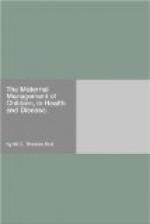Of cough I should not have said any thing in this chapter, as it can never fail to be noticed, except that it is highly necessary to throw out one caution. Whenever a child has the symptoms of a common cold, attended by hoarseness and a rough cough, always look upon it with suspicion, and never neglect seeking a medical opinion. Hoarseness does not usually attend a common cold in the child, and these symptoms may be premonitory of an attack of “croup;” a disease excessively rapid in its progress, and which, from the importance of the parts affected, carrying on, as they do, a function indispensably necessary to life, requires the most prompt and decided treatment.
The following observations of Dr. Cheyne are so strikingly illustrative, and so pertinent to my present purpose, that I cannot refrain inserting them:—“In the approach of an attack of croup, which almost always takes place in the evening, probably of a day during which the child has been exposed to the weather, and often after catarrhal symptoms have existed for several days, he may be observed to be excited, in variable spirits, more ready than usual to laugh than to cry, a little flushed, occasionally coughing, the sound of the cough being rough, like that which attends the catarrhal stage of the measles. More generally, however, the patient has been for some time in bed and asleep, before the nature of the disease with which he is threatened is apparent; then, perhaps, without waking, he gives a very unusual cough, well known to any one who has witnessed an attack of the croup; it rings as if the child had coughed through a brazen trumpet; it is truly a tussis clangosa; it penetrates the walls and floor of the apartment, and startles the experienced mother,—’Oh! I am afraid our child is taking the croup!’ She runs to the nursery, finds her child sleeping softly, and hopes she may be mistaken. But remaining to tend him, before long the ringing cough, a single cough, is repeated again and again; the patient is roused, and then a new symptom is remarked; the sound of his voice is changed; puling, and as if the throat were swelled, it corresponds with the cough,” etc.
How important that a mother should be acquainted with the above signs of one of the most terrific complaints to which childhood is subject; for, if she only send for medical assistance during its first stage, the treatment will be almost invariably successful; whereas, if this “golden opportunity” is lost, this disease will seldom yield to the influence of measures, however wisely chosen or perseveringly employed.
SECT. III.—OTHER CIRCUMSTANCES WHICH WILL ASSIST IN THE EARLY DETECTION OF DISEASE.
1. The influence of the seasons in producing particular forms of disorder.—The recollection of the fact, that at the different seasons of the year some diseases are more prevalent than at other periods, will greatly aid a judicious parent in the early detection of the presence of disorder, and its kind, in her child.




